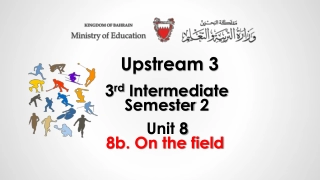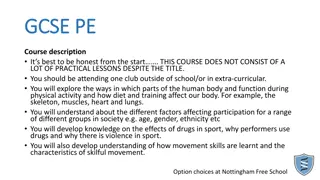
Understanding Sports Psychology: Importance and Applications
Dive into the world of sports psychology, exploring its significance, impact on athletic performance, and overall well-being. Discover how psychological factors influence sports and exercise, and learn how sports psychologists assist athletes in enhancing their mental wellness and athletic abilities. Delve into topics such as the scientific study of behavior, psychological theories, and the role of psychology in understanding and controlling human behavior.
Download Presentation

Please find below an Image/Link to download the presentation.
The content on the website is provided AS IS for your information and personal use only. It may not be sold, licensed, or shared on other websites without obtaining consent from the author. If you encounter any issues during the download, it is possible that the publisher has removed the file from their server.
You are allowed to download the files provided on this website for personal or commercial use, subject to the condition that they are used lawfully. All files are the property of their respective owners.
The content on the website is provided AS IS for your information and personal use only. It may not be sold, licensed, or shared on other websites without obtaining consent from the author.
E N D
Presentation Transcript
SHRI GURU GOBIND SINGH JI GOVT. COLLEGE, PAONTA SAHIB, SIRMOUR (H.P)
B.A. 2nd YEAR COURSE NAME: SPORTS PSYCHOLOGY COURSE CODE: PED202TH
TOPICS TO BE COVERED PSYCHOLOGY SPORTS PSYCHOLOGY IMPORTANCE OF SPORTS PSYCHOLOGY GOAL OF SPORTS PSYCHOLOGY
PSYCHOLOGY According to the American Psychological Association, The scientific study of the behavior of individuals and their mental processes. William McDougall (psychologist) defines, Psychology is a science which aims to give us better understanding and control of the behavior of the organism as a whole. John B. Watson defines, Psychology is the science of behavior. N. L. Munn defines, Psychology is the science and the properly trained psychologist is a scientist or at least a practitioner who uses scientific methods and information resulting from scientific investigations.
Feldman defines, Psychology is the scientific study of behavior and mental processes.it encompasses not just what people do but also their thoughts, emotions, perceptions, reasoning processes, memories, and even the biological activities that maintain bodily functioning. William James defined, psychology as the science of mental life, both of its phenomena and their conditions.
1 : The science of mind and behavior. 2 a : The mental or behavioral characteristics of an individual or group. b : The study of mind and behavior in relation to a particular field of knowledge or activity. 3 : A theory or system of psychology Freudian psychology the psychology of Jung.
SPORTS PSYCHOLOGY Sports psychology is the study of how psychological factors influence sports, athletic performance, exercise, and physical activity. Sports psychologists investigate how participating in sports can improve health and well-being. They also help athletes utilize psychology to improve their athletic performance and mental wellness.
A sports psychologist doesn't just work with elite and professional athletes either. This type of professional also helps non- athletes and everyday exercisers learn how to enjoy sports and stick to an exercise program. They utilize exercise and athletics to enhance people s lives and mental well-being.
IMPORTANCE OF SPORTS PSYCHOLOGY Sport psychologists can also help athletes: Enhance performance. Various mental strategies, such as visualization, self-talk and relaxation techniques, can help athletes overcome obstacles and achieve their full potential. Cope with the pressures of competition.
Sport psychologists can also help athletes: Enhance performance. Various mental strategies, such as visualization, self-talk and relaxation techniques, can help athletes overcome obstacles and achieve their full potential. Cope with the pressures of competition. Sport psychologists can help athletes at all levels deal with pressure from parents, coaches, or even their own expectations. Recover from injuries. After an injury, athletes may need help tolerating pain, adhering to their physical therapy regimens, or adjusting to being sidelined. Keep up an exercise program. Even those who want to exercise regularly may find themselves unable to fulfill their goal. Sport psychologists can help these individuals increase their motivation and tackle any related concerns. Enjoy sports. Sports organizations for young people may hire a sport psychologist to educate coaches about how to help kids enjoy sports and how to promote healthy self-esteem in participants.
GOAL OF SPORTS PSYCHOLOGY Sports-psychology deals with developing performance, its components involve individuals and groups, the relationship between athletes and clubs/associations, as well as healthy lifestyle management, and the psychological questions of physical activities. When opting for a sport commitment is crucial and the athletes interest and devotion should accompany their whole career. Its primary aim is to help athletes achieve the best sports results and to have a long sports career. It should be clear that coach training and teacher training would offer valid, up to date sports-psychology materials and knowledge to students. Either it is an Olympic gold awarded athlete or motivated children their interest and commitments must be developed and evolved






















